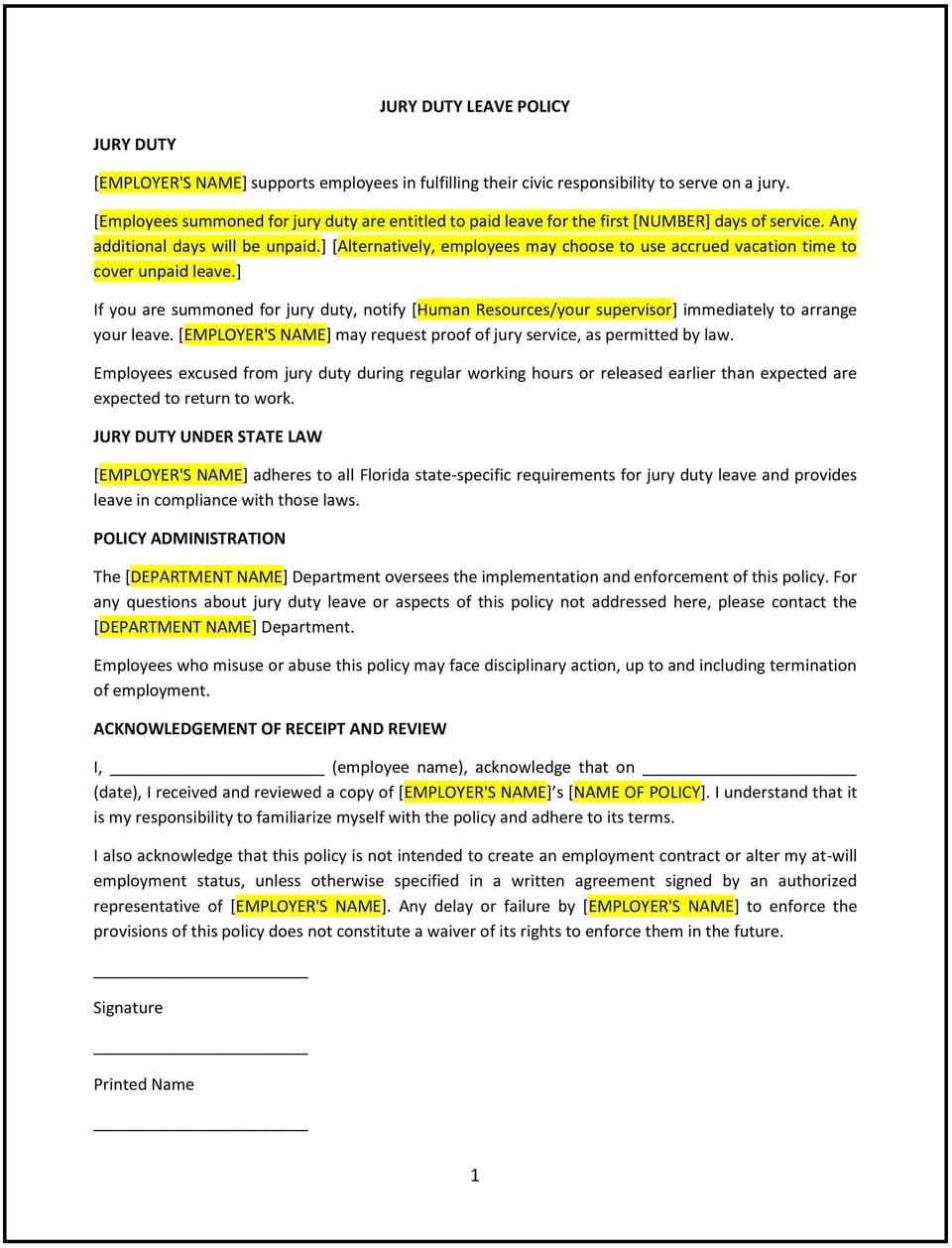Jury duty leave policy (Florida): Free template

Jury duty leave policy (Florida)
A jury duty leave policy helps Florida businesses support employees who are called to serve as jurors. This policy outlines procedures for requesting, approving, and managing time off for jury duty while maintaining operational efficiency. It is designed to promote civic responsibility, reduce stress, and provide clear guidelines for handling jury duty leave requests.
By implementing this policy, businesses in Florida can demonstrate their commitment to supporting employees’ civic duties, foster goodwill, and align with the state’s focus on community engagement and mutual respect.
How to use this jury duty leave policy (Florida)
- Define eligibility: Clearly specify which employees qualify for jury duty leave, such as full-time or part-time staff.
- Establish request procedures: Outline how employees should notify the business of their jury duty summons, including required documentation and timelines.
- Address pay and benefits: Explain whether jury duty leave is paid or unpaid and whether employees will continue to receive benefits during their absence.
- Specify return-to-work expectations: Provide guidance on how employees should communicate their return date and resume work responsibilities.
- Communicate the policy: Share the policy with employees during onboarding and through regular communications to ensure awareness and understanding.
- Monitor adherence: Regularly review how the policy is applied and address any concerns or discrepancies promptly.
- Update the policy: Periodically assess the policy to reflect changes in workplace dynamics, legal standards, or business needs.
Benefits of using this jury duty leave policy (Florida)
This policy offers several advantages for Florida businesses:
- Promotes civic responsibility: Supporting jury duty fosters a culture of community engagement and mutual respect.
- Reduces stress: Providing clear guidelines helps employees manage their obligations without added work-related pressure.
- Builds trust: A clear policy demonstrates the business’s commitment to fairness and employee well-being.
- Aligns with community values: Reflects Florida’s emphasis on civic participation and supporting public institutions.
- Enhances reputation: Demonstrates the business’s dedication to ethical practices and employee support.
- Improves retention: Offering jury duty leave contributes to higher employee satisfaction and loyalty.
- Supports growth: A robust policy facilitates scalable solutions for managing diverse employee needs.
Tips for using this jury duty leave policy (Florida)
- Communicate clearly: Ensure employees understand the policy by providing written materials and discussing it during meetings or training sessions.
- Train managers: Educate supervisors on how to handle jury duty leave requests sensitively and consistently.
- Be flexible: Allow for reasonable adjustments based on individual circumstances to ensure effectiveness.
- Track usage: Maintain records of jury duty leave requests and approvals to monitor trends and ensure fairness.
- Stay informed: Keep up with changes in societal norms, workplace expectations, or state-specific guidelines that may affect jury duty leave practices.
- Encourage feedback: Solicit input from employees to identify areas for improvement and ensure the policy meets their needs.
- Review periodically: Assess the policy’s effectiveness and make updates as needed to reflect changes in workplace dynamics or business goals.
Q: Why should Florida businesses adopt a jury duty leave policy?
A: Businesses should adopt this policy to promote civic responsibility, reduce stress, and demonstrate their commitment to supporting employees’ civic duties.
Q: Should businesses offer paid or unpaid jury duty leave?
A: Businesses should consider offering paid leave for jury duty to align with state-specific norms and demonstrate support for employees fulfilling their civic obligations.
Q: What documentation should businesses require for jury duty leave?
A: Businesses should request reasonable documentation, such as a jury summons or proof of service, to verify the need for leave.
Q: How should businesses handle scheduling conflicts caused by jury duty?
A: Businesses should work with employees to adjust schedules, redistribute tasks, or arrange temporary coverage to minimize disruptions.
Q: What should businesses do if an employee is selected for long-term jury duty?
A: Businesses should engage in open dialogue with the employee to explore options such as extended leave, remote work, or temporary reassignment.
Q: Should businesses require employees to report back after jury duty?
A: Businesses should establish clear expectations for employees to communicate their return date and resume work responsibilities promptly.
Q: How often should businesses review the policy?
A: Businesses should review the policy annually or whenever there are significant changes in workplace dynamics, legal standards, or business operations.
This article contains general legal information and does not contain legal advice. Cobrief is not a law firm or a substitute for an attorney or law firm. The law is complex and changes often. For legal advice, please ask a lawyer.


